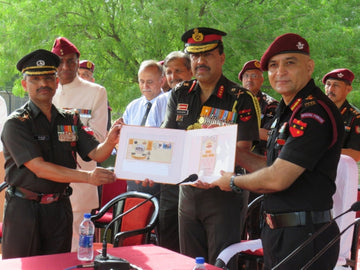The Significance of Self-Reflection in SSB Interviews
The SSB interview is not merely a test of knowledge or military aspirations; it’s a comprehensive evaluation of a candidate's personality, leadership qualities, and suitability for a career in the Defence. For repeaters, understanding why they were not selected in the past and proactively addressing these issues can set them apart. According to a report, about 60% of candidates who approach SSB as repeaters demonstrate improved preparedness and self-awareness, which enhances their chances significantly.
Common Questions for Repeaters
1. Why Were You Not Recommended in Your Previous SSB?
This question serves as a critical reflection point for candidates. Interviewing boards want to know how self-aware you are and whether you've taken proactive steps to improve your shortcomings.
Sample Answer:
“In my previous attempt, I realized that self-confidence and effective communication were areas needing improvement. I struggled to articulate my thoughts during the GTO tasks and fell short of demonstrating my leadership potential. Since then, I have joined Toastmasters to improve my verbal communication skills and engage in group discussions. Additionally, I took a step back to evaluate my mental preparedness and physical fitness, and I have followed a rigorous regimen to enhance these areas. I have also used role-playing scenarios to practice better responses in pressure situations.”
2. What Special Preparation Have You Done This Time to Clear SSB?
This question elucidates your commitment to preparing differently this time and demonstrates your proactive mindset.
Sample Answer:
“This time, my preparation has been holistic. I enriched my communication skills through active participation in debates and continuous reading on current affairs through newspapers and journals. Regular fitness assessments have become part of my daily routine to ensure I meet required physical standards. I have also sought feedback from mentors modeled after successful candidates to understand common pitfalls. This approach not only helped me gain practical skills but also equipped me for both written and verbal assessments.”
3. What Are Your Weaknesses and What Have You Done in the Previous Months to Overcome Them?
Self-awareness along with a demonstrated ability to take corrective action is critical in this response.
Sample Answer:
“My main weakness was time management under pressure. I often found myself overwhelmed during high-stakes moments. To tackle this, I have engaged in time-bound activities, including competitive exams and daily mock tests that require keeping a strict timeline. Practicing mindfulness techniques has allowed me to control my tendency to overthink, enabling me to focus better during assessments. As a result, I see substantial improvement in my performance during timed tasks.”
4. What Did You Perform Best During Your Previous SSB?
This question aims to gauge your self-awareness about your strengths.
Sample Answer:
“I believe I performed best during the Group Tasks. I effectively contributed to our team's discussions, proposed practical solutions, and took the lead when necessary. I learned that collaboration in a group setting is one of my key strengths. This experience taught me the importance of valuing diverse opinions and working cohesively, which I have since studied further in leadership literature.”
5. What is Your Career Plan if You Get Rejected This Time Too?
The essence of this question lies in assessing your resilience and future aspirations.
Sample Answer:
“While I am optimistic about my chances this time, I understand the nature of competitive assessments. If I don’t succeed, I plan to explore alternate career avenues such as becoming a teacher in a military academy or pursuing a career in a civilian role that still contributes to national service, such as civil services. I will also commit to preparing further and attempt the SSB again with lessons learned from this experience.”
Additional Common Questions
- Tell Me About Yourself: Use this opportunity to succinctly summarize your background, education, interests, and experiences that have led you to this moment.
- Tell Us About Your Strengths and Weaknesses: Balance your responses by highlighting a mix of strengths (e.g., teamwork, adaptability) and weaknesses (such as public speaking anxiety) and how you are overcoming them.
- Why Do You Want to Join the Defence Forces?: Your passion and motivations should be clearly articulated—demonstrating a genuine desire to serve the country, aligned with your skills and ethic.
Preparation Tips for Repeaters
To succeed at the SSB interview, repeater candidates should consider the following strategies:
Self-Awareness and Reflection
- Honestly evaluate your past performances. Understanding your previous shortcomings allows you to prepare more effectively.
Holistic Development
- Focus on both academic and personal growth. Engage in activities that build physical fitness, communication abilities, and assertiveness.
Use Specific Examples
- Draw upon real-life experiences to strengthen your responses, especially when discussing strengths and weaknesses.
Structured Answers
- Prepare answers that highlight your thought processes and actions cleanly and logically.
Resources for SSB Preparation
For comprehensive preparation, candidates can refer to various resources provided by SSBCrack:
- Books: "Let's Crack SSB Interview Book" offers thorough guidance on SSB procedures and psychological tests. Another excellent resource is "Breaking The Code of SSB Psychological Tests," which delves into tests and strategies for better performance.
- Online Resources: Websites like SSBCrack provide extensive lists of sample questions, study materials, and tips that are indispensable for candidates wanting to improve.
Statistical Insights on Repeaters' Success
Research data indicates that 60% of SSB repeaters who actively engage in personal development and coaching significantly improve their scores on psychological tests and group tasks. Continuous learning and self-evaluation remain pivotal in these evaluations.
Challenges and Solutions
Given the competitive nature of the SSB interviews, candidates may face several challenges, such as anxiety or lack of clarity on their strengths and weaknesses. Continuous self-evaluation, participation in group activities, and regular physical training can effectively tackle these hurdles.
Case Study: Success of SSB Repeaters
Consider the story of Rohan, who hit a roadblock after his first SSB attempt. Analyzing his shortcomings, Rohan took up public speaking classes and joined a fitness boot camp. By actively embracing feedback from peers, he was able to refine his approach. In his second attempt, Rohan not only passed but emerged as a recommended candidate, showcasing the power of persistence and focused preparation.
Future Trends in SSB Interviews
Looking ahead, the landscape of SSB interviews is evolving. With advancements in psychological testing, candidates may face more nuanced assessments that require deeper self-awareness and adaptability. Online preparation tools and virtual mockup SSBs are becoming increasingly popular, allowing candidates to practice in authentic settings.
Conclusion
Navigating the SSB interview as a repeater demands resilience, introspection, and a strategic approach. By addressing past shortcomings, actively improving skills, and demonstrating a passion for the Defence forces, candidates can greatly enhance their prospects of success. Remember, every experience is a stepping stone toward achieving your goal; thus, continuous reflection and evolution are essential.
For those keen on maximizing their odds in the SSB interview, engaging with robust resources like SSBCrack and staying committed to self-improvement will serve as invaluable allies in this critical journey. Are you ready to transform your preparedness strategies and step forward as a stronger candidate? Your future in the Defence forces awaits!





